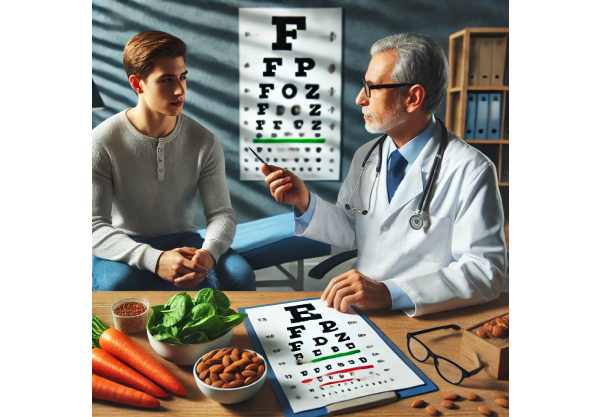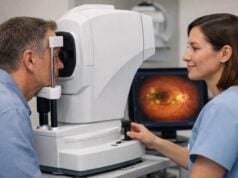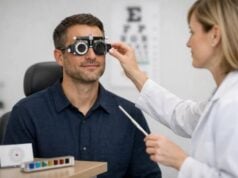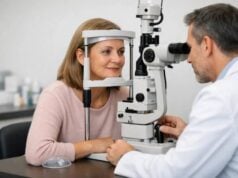
Your eyes are among the most metabolically active tissues in the body, and they rely on a steady supply of nutrients to stay clear, comfortable, and resilient over time. When nutrition is poor—too few protective vitamins and minerals, too little healthy fat, too much added sugar and ultra-processed food—the effects can show up as subtle daily symptoms (dryness, slower night vision, eye fatigue) and, over years, as higher risk for conditions that threaten sight.
The encouraging part is that vision-supportive eating is not a niche diet. It is a practical pattern: colorful plants, enough protein, omega-3-rich foods, and stable blood sugar. This article explains how nutrition influences key structures like the retina and lens, which nutrients matter most, where to find them, when supplements make sense, and how to build a realistic routine that protects eye health without turning meals into a math problem.
Essential Insights for Eye-Friendly Eating
- A nutrient-poor diet can worsen dry eye symptoms, slow dark adaptation, and raise long-term risk for retinal and lens problems.
- Prioritizing leafy greens, orange and red produce, fish, nuts, legumes, and eggs supports the macula and tear film.
- Blood sugar stability matters for the retina; frequent spikes can add stress to delicate eye vessels over time.
- High-dose supplements are not automatically safer or better, and some formulas are inappropriate for certain people.
- A simple rule works well: include one “eye-protective” food at each meal for 30 days.
Table of Contents
- What poor nutrition can do to your eyes
- Which nutrients protect vision the most
- Best foods for retina and macula support
- How diet shapes dry eye, cataracts, and retina risk
- Do eye supplements work and who should skip them
- A practical 30-day plan to eat for eye health
What poor nutrition can do to your eyes
Poor nutrition affects vision in two timelines: fast (how your eyes feel day to day) and slow (how your eye tissues age). The “fast” effects are often dismissed as normal tiredness, but they can be early clues that the eye surface and visual system are under strain.
In the short term, a nutrient-poor pattern can contribute to:
- Dryness and gritty discomfort. The tear film is partly made of oils and fats. If the diet is low in healthy fats or hydration is inconsistent, tears may evaporate faster, leading to burning, blurred vision that comes and goes, and frequent blinking.
- More eye fatigue with screens. Eye fatigue is not only about blue light. It is also about reduced blinking, inflammation, and poor sleep—factors that ultra-processed diets can worsen.
- Slower adjustment to darkness. Vitamin A is essential for the retina’s light-sensing chemistry. If intake is low over time, night vision can suffer.
- More sensitivity to glare. When the tear film is unstable, light scatters more, creating glare and halos, especially when driving at night.
Over the long term, the risk profile changes. The retina and lens are exposed to oxygen, light, and high metabolic activity every day. That combination produces oxidative stress—normal wear that the body controls with antioxidants and repair systems. Diet helps determine how well those defenses work.
Nutrition also interacts with major risk drivers:
- Blood sugar: Frequent spikes can stress small blood vessels, including those in the retina.
- Blood pressure and inflammation: Diet patterns that raise chronic inflammation can indirectly affect ocular tissues.
- Body weight and activity: They shape insulin sensitivity and circulation, which influence eye health.
A helpful way to think about it: poor nutrition rarely causes a single dramatic vision change overnight. Instead, it quietly reduces your “margin of safety,” making everyday irritation more likely and age-related problems harder to resist.
Which nutrients protect vision the most
Eye nutrition is not about one miracle vitamin. Different nutrients support different structures: the retina’s light receptors, the macula’s protective pigments, the lens’s clarity, and the tear film’s stability. When the diet is thin on variety, gaps tend to appear in predictable places.
Vitamin A and carotenoids
Vitamin A supports the retina and the surface of the eye. A long-standing deficiency can impair night vision and, in severe cases, damage the cornea. Many people get enough vitamin A, but low intake becomes more likely with limited produce, restrictive dieting, or poor absorption.
Beta-carotene and other carotenoids from orange and dark-green plants can be converted to vitamin A. Good sources include carrots, sweet potatoes, spinach, kale, and winter squash.
Lutein and zeaxanthin
These carotenoids concentrate in the macula, where they help filter high-energy light and support antioxidant defense. They are strongly tied to leafy greens (kale, spinach, collards) and also show up in egg yolks, which provide a form that is often well absorbed.
Vitamin C and vitamin E
These antioxidants help protect tissues from oxidative stress. The lens, in particular, is vulnerable to oxidation over time, which is one reason diets rich in fruits, vegetables, nuts, and seeds are consistently associated with better aging outcomes across the body.
Zinc and copper
Zinc supports retinal metabolism and helps move vitamin A through the visual cycle. Copper matters because it balances certain high-zinc intakes and supports antioxidant enzymes. Food sources include shellfish, meat, beans, pumpkin seeds, and nuts.
Omega-3 fatty acids
Omega-3 fats support cell membranes throughout the body, including the retina and the glands that help keep tears stable. Many people fall short, especially if they rarely eat fatty fish. Plant sources (like flax and chia) help, but they do not replace fish for everyone because conversion into the most active forms can be limited.
The practical goal is not perfection—it is coverage. The more varied your whole-food intake, the less you rely on any single nutrient to “carry” your eye health.
Best foods for retina and macula support
If you want a diet that protects vision, focus less on isolated nutrients and more on repeatable food combinations that you can use year-round. The retina and macula benefit most from a steady supply of pigments, antioxidants, and healthy fats—delivered in meals your body can absorb.
Build meals around these “eye-support” foods
- Leafy greens (most days): spinach, kale, collards, arugula
These are reliable sources of lutein and zeaxanthin. A simple target is 1 to 2 cups of raw greens daily, or ½ to 1 cup cooked. - Orange and red produce (most days): carrots, sweet potato, pumpkin, red peppers, tomatoes
These support vitamin A pathways and bring additional antioxidants. - Eggs (several times per week): especially the yolk
Eggs provide lutein and zeaxanthin in a fat-containing package that often improves absorption. - Fatty fish (2 times per week when possible): salmon, sardines, mackerel, trout
This supports omega-3 intake and may help tear stability. - Nuts and seeds (daily small portion): almonds, walnuts, sunflower seeds, chia, flax
These contribute vitamin E, minerals, and healthy fats. - Legumes (several times per week): lentils, chickpeas, beans
They add zinc, protein, and fiber that supports blood sugar stability. - Fruit variety (daily): citrus, berries, kiwi
These boost vitamin C and polyphenols.
Pairing matters for absorption
Some eye-relevant nutrients are fat-soluble. If you eat leafy greens with no fat at all, you may absorb less of the carotenoids. A practical trick is to add:
- 1 tablespoon olive oil on salad
- a handful of nuts or seeds
- avocado slices
- eggs alongside greens
A “macula plate” template
Try this easy structure for lunch or dinner:
- ½ plate colorful vegetables (include leafy greens)
- ¼ plate protein (fish, beans, chicken, tofu)
- ¼ plate high-fiber carbs (brown rice, oats, quinoa, potatoes with skin)
- add a small healthy fat (olive oil, nuts, or avocado)
This pattern supports the eye directly and improves metabolic health, which indirectly protects the retina over time.
How diet shapes dry eye, cataracts, and retina risk
Nutrition affects vision through a few “big pathways”: inflammation, oxidation, vascular health, and the quality of the tear film. These pathways show up clearly in common eye concerns.
Dry eye and eye surface discomfort
Dry eye is more than “not enough tears.” It is often about tear quality—especially the oily layer that slows evaporation. Diet patterns that are low in omega-3 fats and high in ultra-processed foods may make symptoms harder to manage for some people. Practical supports include:
- regular fatty fish intake (or clinician-guided omega-3 supplementation when appropriate)
- steady hydration habits
- limiting alcohol excess and highly salty processed foods that can worsen dehydration feelings
Cataracts and lens aging
The lens is designed to stay clear for decades, but it is sensitive to oxidative stress. Diets rich in fruits and vegetables are associated with lower cataract risk in many observational studies, likely because they provide a broad antioxidant mix and support overall metabolic health. Two important nuances:
- More antioxidants from food is generally beneficial, but high-dose supplementation is not always better.
- Smoking, UV exposure, and uncontrolled metabolic disease can overwhelm dietary benefits.
Retina risk in diabetes and metabolic stress
The retina depends on tiny, delicate blood vessels. When blood sugar runs high frequently, those vessels face more stress. Over time, this can contribute to retinal damage in people with diabetes. For retinal protection, the most powerful nutrition strategy is often unglamorous:
- keep carbohydrate portions consistent
- prioritize high-fiber carbs over refined starches
- pair carbs with protein and healthy fats
- reduce sugary drinks and frequent desserts
Macular health and long-term protection
The macula’s “yellow pigments” (from lutein and zeaxanthin) act like internal sunglasses and antioxidant support. People who regularly eat leafy greens, eggs, and colorful vegetables tend to maintain stronger dietary support for these pigments.
The key point: nutrition does not work in isolation. It multiplies the benefits of other protective choices—like not smoking, managing blood pressure and glucose, and wearing proper UV protection outdoors.
Do eye supplements work and who should skip them
Supplements can be useful in specific situations, but they are not a substitute for a high-quality diet. The safest approach is to treat supplements like targeted tools: appropriate for certain people, unnecessary for others, and occasionally risky when taken in the wrong form or dose.
When supplements may help
- Clinician-recommended formulas for intermediate age-related macular degeneration: Some evidence-based combinations have been used to reduce progression risk in defined AMD stages. These are not “general eye vitamins” for everyone, and they do not prevent AMD from starting.
- Omega-3 supplementation for dry eye symptoms: Some people report meaningful symptom improvement, especially when the supplement dose and duration are adequate and the product quality is reliable.
- Correcting a true deficiency: If bloodwork or clinical signs suggest deficiency (for example, iron, vitamin D, or certain B vitamins), correcting it can support overall tissue health, including the eyes.
When supplements can be a poor fit
- High-dose beta-carotene for current or former smokers: Certain high-dose beta-carotene approaches are not advised in this group. This is a “do not guess” situation—use a clinician-guided formula.
- High-dose zinc without balance or monitoring: Zinc can upset the stomach, affect copper balance, and cause problems when taken in excess over time.
- Vitamin E or fish oil in people on anticoagulants or with bleeding risk: This does not automatically rule them out, but it raises the need for medical guidance.
- “Mega-dose” stacks: Products that combine many nutrients at high levels can create interactions and side effects, and they often distract from the habits that matter most.
A sensible decision framework
- Identify your goal (dry eye comfort, AMD guidance, general diet gaps).
- Start with food changes for 4 to 8 weeks.
- If symptoms or risk remain, discuss supplement choices with an eye care professional or clinician who knows your health history.
- Choose one targeted supplement at a time, with a clear dose and reassessment plan.
If a supplement does not have a clear purpose, it usually does not deserve a place in your routine.
A practical 30-day plan to eat for eye health
The best nutrition plan is the one you can keep. Instead of a strict diet overhaul, use a 30-day structure that builds momentum and reduces decision fatigue. The goal is to increase nutrient density and stabilize blood sugar while keeping meals enjoyable.
Week 1: Add before you subtract
Each day, add:
- 1 serving leafy greens (raw or cooked)
- 1 serving orange or red produce
- 1 handful of nuts or 1 tablespoon seeds
Examples:
- spinach omelet with tomatoes
- lentil soup plus a side salad
- yogurt with berries and chia
Week 2: Anchor omega-3 and protein
Add:
- 2 fish meals this week (or discuss alternatives if you do not eat fish)
- protein at breakfast (eggs, Greek yogurt, tofu scramble, or beans)
This helps with tear film support and reduces mid-morning sugar crashes that can drive snacking.
Week 3: Upgrade carbohydrates
Choose one “swap” per day:
- white bread → whole grain
- sugary cereal → oats
- soda or juice → sparkling water or unsweetened tea
- pastries → fruit plus nuts
You are not banning treats—you are reducing the frequency of the most retina-unfriendly pattern: repeated refined sugar spikes.
Week 4: Lock in routines that survive busy days
Create a simple “default shopping list”:
- leafy greens (2 types)
- carrots or sweet potatoes
- berries or citrus
- eggs
- canned sardines or salmon (or an alternative protein)
- beans or lentils
- nuts or seeds
- olive oil
Common mistakes to avoid
- Relying on supplements while meals stay ultra-processed
- Skipping fat entirely (it can reduce absorption of key carotenoids)
- Ignoring hydration and sleep, which strongly influence eye comfort
- Treating “healthy” snacks as unlimited (portion still matters for blood sugar)
If you want one daily rule that works: include a leafy green plus a healthy fat at least once per day, and keep added sugar as an occasional choice rather than a daily habit.
References
- AREDS/AREDS2 Clinical Trials | National Eye Institute 2025 (Guidance)
- Antioxidant vitamin and mineral supplements for slowing the progression of age-related macular degeneration – PubMed 2023 (Systematic Review)
- Efficacy of Omega-3 Intake in Managing Dry Eye Disease: A Systematic Review and Meta-Analysis of Randomized Controlled Trials – PMC 2023 (Systematic Review)
- Influence of Diet, Dietary Products and Vitamins on Age-Related Cataract Incidence: A Systematic Review – PMC 2023 (Systematic Review)
- [Diabetic retinopathy and risk modification through diet and dietary supplements] – PubMed 2025 (Review)
Disclaimer
This article is for educational purposes only and does not provide medical advice. Nutrition can support eye health, but it cannot diagnose, treat, or cure eye disease on its own. If you have sudden vision changes, eye pain, new flashes or floaters, or rapidly worsening symptoms, seek urgent care. If you have diabetes, high blood pressure, kidney disease, bleeding disorders, or you take prescription medications (including blood thinners), speak with a licensed clinician before starting high-dose vitamins, minerals, or omega-3 supplements.
If this guide helped you, please share it on Facebook, X (formerly Twitter), or any platform you prefer, and follow us on social media. Your support through sharing helps our team continue producing high-quality health content.






